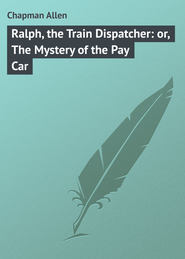По всем вопросам обращайтесь на: info@litportal.ru
(©) 2003-2024.
✖
The Radio Boys at Ocean Point: or, The Message that Saved the Ship
Настройки чтения
Размер шрифта
Высота строк
Поля
“The pity of it was,” said Joe, “that nobody was around to see you do it. Ten to one he told his cronies afterward that it was he who licked you. But there was no mistake yesterday. Lutz and Mooney were standing close by and saw him take water. He turned fairly green with fright when he saw you double up your fists. You want to keep your eyes open, Bob, for he’ll try to get even by doing you a dirty trick whenever he thinks he can get away with it safely.”
“Let him try,” replied Bob indifferently. “That’s the least of my worries. What’s bothering me a good deal more now is why Jimmy and Herb haven’t turned up to help us out on this job.”
“Guess they’ve got stalled somewhere,” hazarded Joe. “But even if they don’t turn up we’ll be done in half an hour or so. Then it’s me for a cold bath and some dry clothes! I’m drenched to the skin.”
A half hour later there was no sign of the truants, but the job was done, and Bob and Joe ran their eyes over it with keen satisfaction.
“Some little mechanics, old scout!” chuckled Bob, slapping his friend on the shoulder. “Now for that cold bath you were – ”
He stopped suddenly and gave vent to an exclamation of surprise.
“What’s the matter?” queried Joe, who was adjusting his belt.
“The ladder!” exclaimed Bob. “It’s gone!”
Joe looked toward the edge of the roof, and saw that the top of the ladder by which they had mounted was no longer in sight.
“It must have fallen down,” he said; “but it’s queer we didn’t hear it.”
“Fallen nothing!” snorted Bob, as he crawled to the edge of the roof and looked over. “It was resting solidly against the roof when we left it, for I shook it with my hand to make sure. Somebody has taken it down. There it is lying on the ground, twenty feet away from the barn.”
“Now we’re in a nice fix!” exclaimed Joe, in dismay. “Have we got to stay here all the afternoon and be baked to a frizzle by this scorching sun? Call to somebody in the house, Bob.”
“That’s the worst of it,” replied Bob lugubriously. “Mother’s out calling to-day and there isn’t a soul at home.”
The boys looked at each other, and the same thought came into the minds of both.
“Buck Looker!” they exclaimed in one voice.
“That’s who it was,” declared Bob savagely. “He and his gang have done this. If we could see him, it follows that he could see us, and he thought he’d keep us up here broiling while he had the laugh on us. No doubt the whole crowd are hiding somewhere and watching us at this minute.”
“Well, they’re not going to make a show of us,” Joe almost shouted in his wrath. “I’m going to get down off this roof and I’m going to get down quick, ladder or no ladder.”
Before Bob could stop him he had grasped the water pipe that ran alongside the barn and started to slide down.
“Don’t! Don’t!” cried Bob, in alarm. “The pipe’s rusty! It’ll break! For the love of Pete – ”
His voice ended almost in a scream.
For at that moment what he feared happened.
The pipe broke beneath Joe’s weight. The lad felt it going and grabbed frantically at the upper part that was still fastened to the roof. He caught it and held on, his legs dangling in the air directly over the pile of rocks more than twenty feet below. To fall on those rocks meant broken limbs or death!
CHAPTER II – JUST IN TIME
At just the place in the pipe that Joe had grabbed there was a band running around it, perhaps a quarter of an inch thick. It was smooth and slippery, but yet gave more support to his clutching hands than would have been afforded by the pipe itself. To this precarious support poor Joe clung with desperation that was rapidly becoming despair as he felt his arms tiring and his hands slipping. A glance below had told him what awaited him if he fell on that pile of rocks.
Simultaneously with the breaking of the pipe Bob had flung himself at full length on the roof, with his arm extended over the edge. His feet felt around frantically and found a cleat in the roof in which he gripped his toes. Reaching as far as he could over the edge with one hand and holding on with the other, he found that he could just reach Joe’s hands with his own.
If the roof had been flat, he might have been able by sheer strength to pull his friend up. But it was sloping, and, as he lay, his feet were considerably higher than his head. So he had no purchase, no way to brace himself and pull upward. As it was, he had to dig his toes tightly against the cleat just to sustain the weight of his own body.
There was imminent danger that if he even grasped Joe’s hand the added weight would pull him over the edge of the roof. But this did not deter him for a second. He reached down and caught Joe around one of his wrists.
“I can’t pull you up, Joe,” he panted; “but I can hold on to you until help comes.”
He lifted up his voice to shout for help, when just at that instant Herb Fennington and Jimmy Plummer turned the corner of the barn. They were talking and laughing gaily together, but stopped short with a cry of alarm as they saw the terrible plight of their friends.
“Quick! Quick!” cried Bob. “Get the ladder and put it up. Quick!”
There was no need of his frantic adjuration, for Jimmy and Herb understood instantly the tragedy that impended. They ran for the ladder, and with some difficulty, for it was long and heavy, put it up alongside the barn and close to Joe’s swaying figure.
Then Herb, who was the stronger of the two, ran up the rungs until he was directly opposite his comrade.
“I’ll hold on to one arm, Joe,” cried Bob. “Let go the pipe with the other and give it to Herb.”
Joe did as directed and the two boys swung him over to the ladder. He felt for the rung with his feet, and when they were firmly planted on it, Herb placed one of his hands on another rung and Bob followed suit. Then while Jimmy held the ladder at the foot to keep it from slipping, Joe and Herb made their way slowly to the ground and Bob came after.
They seated Joe on a box that stood nearby, and his comrades crowded around him; joyful beyond words at his narrow escape, clasping his hands and slapping him on the back.
Joe was gasping under the muscular and nervous strain that he had undergone in the few minutes that had seemed to him like ages, but he rallied gamely and tried to joke.
“I said I was going to get down off that roof quick,” he said. “But I came mighty near coming down quicker than I wanted to. I can’t thank you fellows enough.”
And while they stand around him jubilating over his rescue, it may be well, for the benefit of those who have not read the preceding volume of this series, to tell who the Radio Boys were and what had been their adventures up to the time this story opens.
Bob Layton was a stalwart, vigorous youth of fifteen years, who lived in the thriving town of Clintonia, a city of about ten thousand population and located some seventy-five miles from New York City. His father was a prosperous druggist and chemist, esteemed and respected, and a leader in the civic life of the town. Bob was tall for his years, of dark complexion, with merry, flashing eyes. He was a leader in baseball, football, and the other athletic sports in which boys of his age delight. He was frank, truthful, courageous and a general favorite.
His special chum was Joe Atwood, son of a prominent doctor of Clintonia. Joe differed from Bob in being fair-skinned instead of dark. But the qualities of character of both boys were such as to make them close friends, and where one was to be found the other was seldom very far away. Joe, however, was impulsive, and his temper was of the “hair trigger” variety that required frequent curbing from his cooler-headed chum.
Of the many friends they had in town, the chief perhaps were Herbert Fennington and Jimmy Plummer. Herbert, or Herb, as he was usually called, was the son of a merchant, and was an easy-going, good-natured boy who was not especially fond of work, but who had an unusual liking for jokes and conundrums. He was slightly younger than Bob and Joe, but not enough to make much difference. Jimmy Plummer, the youngest of the four, was the son of a carpenter. He was jolly, fat, and round, with an appetite that made him the subject of good-natured jesting on the part of the other boys. He had been nicknamed “Doughnuts” because of his special fondness for that toothsome delicacy, and he did his best to live up to the name.
The boys were always much together, but of late their association had become still closer because of their common interest in the wonders of the wireless telephone. The marvelous features of this great invention had caught fast hold of their youthful imaginations, and they were soon so much absorbed in it that almost everything else was forgotten, or at least had to take second place.
Two things happened at almost the same time that increased their enthusiasm in this subject. One was a talk given to them on radio discoveries by Dr. Amory Dale, the pastor of the Old First Church of Clintonia, who had a scientific turn of mind and was most keenly interested in radio. The inspiration he gave them by his talk, together with practical object lessons on the making of radio sets, had an importance that could hardly be overestimated.
Shortly after this the member of Congress from the district in which Clintonia was included, Mr. Ferberton, offered prizes open for competition to all the boys of the district for the best radio sets made by the boys themselves. As the first prize was for a hundred dollars and the second for fifty, they were well worth trying for, and Bob, Joe, and Jimmy set to work in earnest to win one of them. Herb, owing to his natural indolence, did not enter into the competition, a circumstance that he afterward regretted.
They had a good many troubles and misadventures about this time, owing chiefly to the malice of Buck Looker, a bully of the town, who, together with his cronies, Carl Lutz and Terry Mooney, almost as bad as himself, did all they could to hinder the radio boys in their plans. Jimmy’s set was stolen by them on one occasion and on another Bob detected Buck trying to destroy his aerial at night, and gave the bully the trouncing that he richly deserved.
A curious accident that happened in the town opened to the boys a mystery that seemed difficult of solution and set their feet on the path of exciting adventures. How they rescued a girl whose automobile had run wild and dashed through the windows of a store, what they learned of her story and how they got on the track of a rascal who had swindled her, and what part the radio played in the unraveling of the plot, are narrated in the first book of this series, entitled: “The Radio Boys’ First Wireless; Or, Winning the Ferberton Prize.”
It did not take Joe long to recover from the shock he had had when he found himself suspended in midair over the rocks that had been gathered for the repairing of the foundation of the barn. Bob’s danger also had been great, and all felt that they had reason for being profoundly grateful over the happy outcome of the adventure.
“You just came in time, fellows,” said Bob. “Joe is no featherweight, and my arm was getting numb. A minute or two more and we’d both have had a tumble that I hate to think about.”
“That shows what good judgment we had in picking just the right time to come,” replied Jimmy, winking slily at Herb. “It takes some brains to be Johnny-on-the-spot just when you’re needed. Not a minute too late, not a minute too soon – that’s my motto.”
“I’ll admit that you took good care not to get here too soon,” replied Bob, with a laugh. “Where have you been all the afternoon? Why did you leave Joe and me to hold the bag?”











